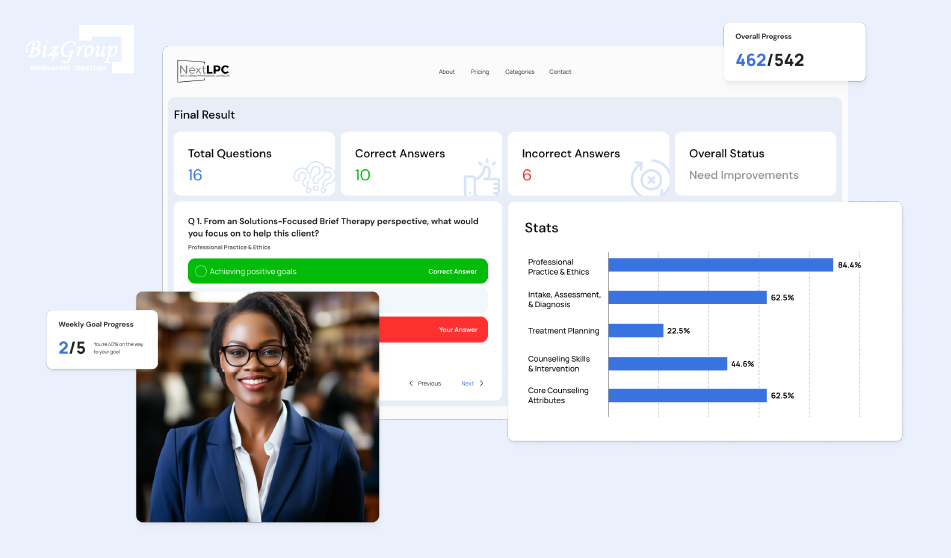Basic AI Chatbot Pricing: A simple chatbot that can answer questions about a product or service might cost around $10,000 to develop.
Read More

TL; DR

Cost to develop a psychotherapy training ai app - $50,000 - $120,000/project.

Start with an MVP – Build only essential AI training features first, then expand based on user feedback.

Use Pre-Trained AI Models – Avoid high AI development costs by fine-tuning existing models.

Outsource AI software Development – Hiring an AI development company like Biz4Group saves money and speeds up deployment.
📌 Smart Business Move: Keep costs lean by launching a focused MVP with scalable AI capabilities before expanding into full-feature solutions.
Before Investing: Doubts to burst about building AI-based Psychotherapy Training App
Though you're interested now in developing AI-powered psychotherapy training app for aspiring therapists. As an EdTech startup, you might have some doubts. It's important to address these, before you learn the cost to develop psychotherapy training AI app. Here goes the first:
Can AI really assess a student's emotional intelligence in a case study?
AI can't feel emotions, but it can analyze and assess emotional intelligence. Such analysis is done based on speech, tone, language, and sentimental patterns. Here's how:
1. Sentiment Analysis
AI analyzes tone, choice of words, sentence structure, and pacing to detect emotional intent.
AI flags responses that lack empathy or seem too robotic.
For example, If a trainee responds to a distressed patient with “You’ll be fine”, AI can identify the lack of emotional depth. It would then suggest a more compassionate response.
2. Voice & Tone Recognition for Emotional Cues
AI-powered speech analysis tools can detect voice tremors, hesitation, and pitch variations to determine emotional engagement.
So, when a student rushes through a response or sounds disengaged, AI can flag it as a potential empathy gap.
3. Facial Emotion Recognition (FER) for Nonverbal Cues
When paired with computer vision, AI can study facial expressions and body language to evaluate student reactions.
Example: A student maintains a neutral face while discussing a patient’s trauma. AI would then suggest a more appropriate emotional engagement strategy.
AI therapy training apps must follow global data protection rules. This helps stop unauthorized access to data. You can use anonymized therapy datasets to train AI models. This prevents any likely breaches of confidentiality. Also, regular audit checks will ensure that AI remains unbiased to avoid reinforcing harmful stereotypes.
Most importantly, keep human-in-the-Loop. This means that licensed mental health professionals must review your AI-generated therapy scenarios before deployment.
Real-World Example: Psychology researchers at MIT are working on explainable AI models to ensure that AI applications are transparent and bias-free. Their project uses machine learning to analyze data from wearables and smartphones, enabling personalized mental health care by tracking behaviors like sleep, social activity, and physiological responses.

So yes, it’s a great idea to launch an AI-powered app for psychotherapy training.
Now, let’s move to the next section where you’ll get to learn the detailed cost to build psychotherapy training AI app. However, before you scroll through every detail, know that an average cost to develop an AI app for psychotherapy lies between - $50,000 - $120,000/project.
Budgeting for psychotherapy training AI app development calls for various factors to be considered. Let’s go through each factor and understand the importance, along with the costs associated:
An AI model is the core engine of a smart app. In a psychotherapy training app, it is trained on simulated patient interactions. When therapy students interact with these apps, the AI compares student responses to patient case scenarios in real-time. It then provides instant feedback on therapeutic techniques, communication style, and emotional intelligence.
Below is the average hourly price for various AI models:
|
AI Model Type |
Benefits |
Estimated Cost (Based on $40/hr Rate) |
|
Pre-Trained AI Models (GPT, Hugging Face, Dialogflow) |
Quick to deploy, lower cost |
$10,000 - $20,000 |
|
Custom AI Model Development |
More control over features, but expensive to build |
$20,000 - $48,000 |
|
Hybrid Approach (Pre-Trained + Custom Fine-Tuning) |
Best balance of cost & customization |
$16,000 - $32,000 |
For most AI owners out there, it is often recommended to adopt pre-built AI models and fine-tune them. It allows more control over functionality while keeping the cost of AI model low.
AI needs quality training data. The therapy training app should include patient case studies but acquiring and annotating real psychotherapy case studies is expensive. You must decide whether to use existing datasets or invest in proprietary data.
As per our expertise and experience of developing a psychotherapy training app, we would recommend you choose the hybrid approach. This approach will provide you with a large number of patient cases, along with simulated ones. Below are the data types with their respective costs:
|
Data Type |
Description |
Estimated Cost |
Cost-saving Strategies |
|
Text Data |
Conversational data, therapy transcripts, case studies, session notes. |
$4,000 - $8,000 |
Use publicly available datasets, open access academic papers, and combine with anonymized case studies from therapists. |
|
Psychological Assessment Data |
Data from standardized psychological tests (e.g., Beck Depression Inventory). |
$1,000 - $3,000 |
Use open-source or freely available psychological assessment datasets. |
|
Simulated Data |
AI-generated synthetic therapy dialogues and scenarios for training. |
$2,000 - $4,000 |
Utilize existing open-source AI dialogue models to generate initial scenarios. |
|
Expert Feedback Data |
Annotated feedback from therapists (small sample). |
$3,000 - $6,000 |
Partner with a small number of volunteer or low-cost therapists for feedback. |
|
Patient Demographic Data |
Anonymized demographic profiles for personalization. |
$1,000 - $2,000 |
Use existing, publicly available demographic datasets, anonymized. |
|
Behavioral Data |
Data on user interactions and behavior (basic data collection). |
$1,000 - $3,000 |
Start with basic interaction logs in the app for initial behavior data. |
Designing a psychotherapy training AI app requires a well-thought-out UI/UX strategy to ensure usability, accessibility, and engagement. Below is the detailed cost breakdown for essential UI/UX components.
|
UI/UX Design Component |
Necessity |
Estimated Cost |
|
User Research & Wireframing |
High priority |
$4,000 - $8,000 |
|
Interactive UI Mockups & Prototyping |
High priority |
$5,000 - $10,000 |
|
AI-Driven Learning Dashboard |
High priority |
$8,000 - $24,000 |
|
Multi-Language Support |
Optional (depends on market) |
$4,000 - $8,000 |
|
Gamification Features (Quizzes, Streaks, AI Assessments) |
Medium priority |
$6,000 - $12,000 |
|
Mobile Responsiveness & Cross-Platform Design |
High priority |
$6,000 - $14,000 |
|
Accessibility Features (ADA, WCAG Compliance) |
High priority |
$5,000 - $12,000 |
|
User Testing & Usability Improvements |
High priority |
$4,000 - $8,000 |
Integrating a raining app with Learning Management Systems (LMS) is critical for seamless adoption by institutions. Here’s why each cost factor in LMS integration matters:
|
LMS Integration Component |
Necessity |
Estimated Cost (Based on $40/hr Rate) |
|
API Development for Canvas, Moodle, Blackboard |
High priority |
$10,000 - $20,000 |
|
Single Sign-On (SSO) & User Authentication |
High priority |
$6,000 - $12,000 |
|
Automated Student Progress Tracking & Reporting |
High priority |
$8,000 - $15,000 |
|
AI-Driven Adaptive Learning Paths |
Medium priority |
$7,000 - $14,000 |
Smart Business Move: Start with basic integration and offer premium LMS features as a paid add-on.
If you're looking to enhance accessibility, consider a companion mobile app for your AI-powered psychotherapy training platform. Check out the mobile app development services offered by Biz4Group.
As per American Counseling Association, AI-powered psychotherapy training apps must embed privacy and security measures into their core design, following Privacy by Design principles to protect sensitive data throughout the app's lifecycle.
| Security Measure | Cost (Based on $40/hr Rate) |
| HIPAA & GDPR Compliance Audits | $8,000 - $24,000 |
| Data Encryption & Secure Cloud Storage | $4,000 - $12,000 |
Smart Business Move: If your app doesn’t handle real patient data, you may not need full HIPAA compliance, but GDPR guidelines still apply.
AI apps require continuous cloud hosting and model retraining, which means recurring expenses. Below are the hosting options you can consider as per the current scale of training application:
|
Hosting Option |
Cost (Based on $40/hr Rate) |
|
Cloud-Based AI Deployment (AWS, Google Cloud, Azure) |
$12,000 - $24,000/year |
|
On-Premise Hosting (More Secure, but Expensive Upfront) |
$40,000+ setup cost |
Smart Business Move: Opt for cloud-based AI hosting to reduce upfront costs and scale as demand increases.
The AI in education sector is growing at 31.2% CAGR, reaching $32.27B by 2030.
Schedule a Call|
Cost Component |
Estimated Cost (Based on $40/hr Rate) |
|
AI Model Development |
$10,000 - $48,000 |
|
Data Collection & Annotation |
$4,000 - $20,000 |
|
UI/UX & Platform Design |
$4,000 - $24,000 |
|
LMS & API Integration |
$8,000 - $20,000 |
|
Compliance & Security |
$8,000 - $24,000 |
|
AI Hosting & Maintenance |
$12,000 - $24,000/year |
|
Total Estimated Development Cost |
$50,000 - $172,000+ |
Now that we’ve established the cost breakdown, the next logical step is to explore budget optimization strategies that help startups, universities, and investors develop an AI psychotherapy training app without unnecessary expenses.
Instead of building a full-featured AI training app from day one, startups and universities should prioritize essential features and launch a Minimum Viable Product (MVP) first.
Below is the feature options included in the cost to build an MVP for psychotherapy training AI app:
|
Feature |
Priority |
Estimated Development Time (Hours) |
Cost (@$40/hr) |
|
AI-Simulated Patient Roleplay |
High |
250 |
$10,000 |
|
Real-Time Feedback & Sentiment Analysis |
High |
200 |
$8,000 |
|
Basic LMS Integration (Canvas/Moodle) |
Medium |
150 |
$6,000 |
|
Gamification Features |
Low |
100 |
$4,000 |
💰 Cost Savings: Launching an MVP first can reduce initial development costs by up to 50%, focusing on core functionality while deferring non-essential features for later updates.
Hosting an AI-powered psychotherapy training app on-premises servers require expensive infrastructure and ongoing maintenance. Instead, cloud-based hosting solutions offer scalability with lower upfront costs.
✔ AWS AI Services
Pay-as-you-go AI processing without upfront infrastructure investment.
✔ Google Cloud AI
Cost-efficient NLP and AI model hosting with usage-based billing.
✔ Microsoft Azure Cognitive Services
Offers flexible cloud hosting for AI-based applications.
💰 Cost Savings: Using pay-as-you-go cloud models instead of on-premise hosting can reduce infrastructure costs by 60%.
Hiring a full-time AI development team requires a significant upfront investment, while outsourcing allows for flexibility and lower hourly rates.
|
Development Approach |
Average Cost |
Best For |
|
In-House Team (4+ Members) |
$200,000 - $400,000/year |
Large institutions with long-term AI needs |
|
Outsourced AI Development |
$50,000 - $120,000/project |
Startups & universities with limited budgets |
💰 Cost Savings: Outsourcing AI development company in USA, like Biz4group, reduces the software development expenses by 50-70% compared to hiring a full-time team.
Reasons why outsourcing the app development would save a huge operational cost for you!
Cost Efficiency: Outsourcing allows businesses to cut expenses while accessing top-tier AI expertise.
Access to Specialized AI Talent: Developing AI avatars, NLP-based simulations, and real-time feedback mechanisms requires a diverse tech stack. Companies like Biz4Group bring pre-built expertise and save months of R&D.
Faster Time-to-Market: AI software development firms have ready-to-deploy solutions. Hiring such firms drastically reduces development time.
Scalability & Support: Unlike an in-house team that may lack bandwidth for expansion, outsourcing partners offer continuous upgrades and tech support.
These strategies will surely help you optimize the cost to build your own AI therapy app. One of our clients, NextLPC enjoyed the same strategies to limit their cost. Check the case study below:
Read for your inspiration.

NextLPC is an AI-powered eLearning solution designed to assist psychotherapy students in their educational journey. Developed by Biz4Group, this platform integrates AI-driven avatars that simulate real-world counseling sessions, providing an interactive learning experience.
The goal behind NextLPC was to bridge the gap between theoretical learning and practical application in psychotherapy training. Traditional eLearning methods lacked engagement, personalization, and real-world simulations.
We leveraged Open AI and an Avatar video platform (d-id) to create AI avatars of therapy teachers. These avatars would then assist the learners/students during the assessment.
Speaking of EdTech solution, you may want to explore: eLearning app development
Word from the founder of NextLPC


Recently, Stanford University developed a web-based psychotherapy training app called Clinical Mind AI. The development of Clinical Mind AI is led by a team of researchers, including project manager Marcos Rojas Pino. He brings his experience as a physician from Chile. The team collaborates closely with software engineers and designers to create a user-friendly interface that facilitates seamless interaction between students and the AI-driven virtual patients.
The platform empowers healthcare instructors worldwide with advanced tools to create realistic clinical case simulations for student training.
Clinical Mind AI offers a customizable feedback option to instructors. On the basis of the feedback received from student’s end for a patient's case study simulation, instructors can tailor the simulation. This customization ensures that the simulated patient interactions are relevant and effective across different cultural and educational settings. This helps to deliver personalized learning.
Instructors can design patient simulations from the ground up using intuitive tools or choose from an expanding library of pre-built case studies, including both institution-specific and publicly available scenarios. This ensures educators have access to a diverse range of resources to enhance training.
Additionally, instructors can develop customizable rubrics to evaluate student performance within simulations, aligning assessments with key learning objectives.
Beyond simulations, Clinical Mind AI facilitates the creation of clinical case activities, guiding students through structured learning experiences. These activities may include preparatory questions, supplementary materials, and post-simulation assessments, all designed to reinforce critical thinking and practical application.
Launch an MVP for your AI-powered psychotherapy training app. Refine it with early user feedback.
Let’s ConnectBuilding an AI-powered psychotherapy training app is more than just an innovation—it’s a strategic investment in the future of mental health education. Whether you’re an EdTech startup or investor, understanding cost allocation and monetization strategies ensures a sustainable and high-ROI approach.
Ready to manifest your AI training vision to life? Let’s build a cost-efficient & scalable solution together!
On average, a basic development can cost between $50,000 - $120,000.
Key cost factors include:
✔ AI Model Development – NLP, emotion recognition, and therapy simulation models.
✔ Data Collection & Training – Acquiring anonymized therapy datasets.
✔ UI/UX Design – Intuitive interfaces for student engagement.
✔ LMS & API Integrations – Connecting with existing university platforms.
✔ Compliance & Security – Meeting HIPAA, GDPR, and APA guidelines.
To optimize costs, consider:
✔ Using pre-trained AI models instead of building from scratch.
✔ Use open-source therapy datasets to cut data annotation costs.
✔ Launching a (MVP) first, then scaling later.
✔ Outsourcing development to an AI software development company.
The development timeline depends on scope and features:
✔ MVP with basic AI therapy simulations: 3-6 months
✔ Full-scale AI training platform with LMS integration: 6-12 months
✔ Advanced AI model with real-time feedback & compliance implementation: 12+ months
IN YOUR BUSINESS FOR FREE
Our website require some cookies to function properly. Read our privacy policy to know more.